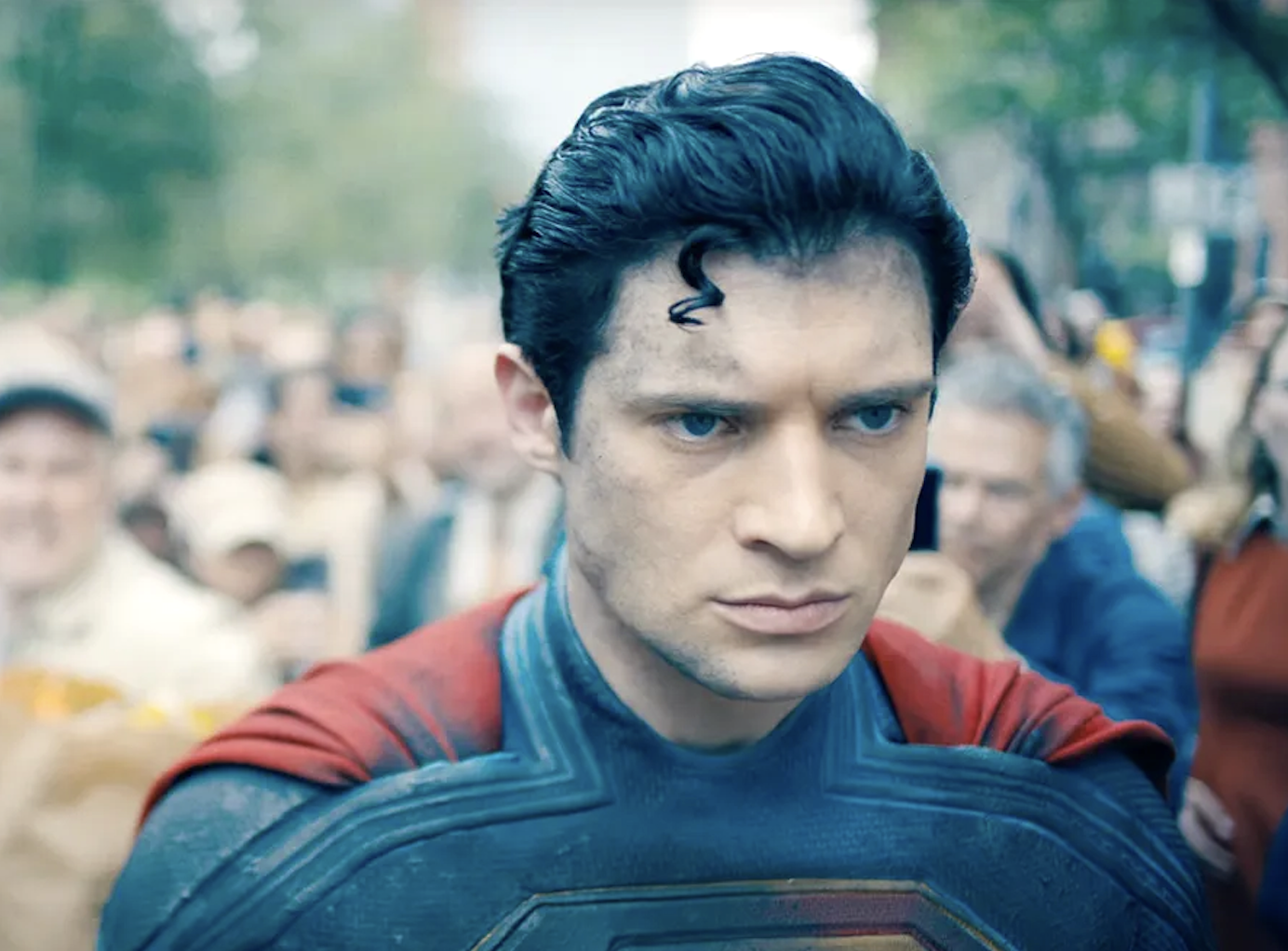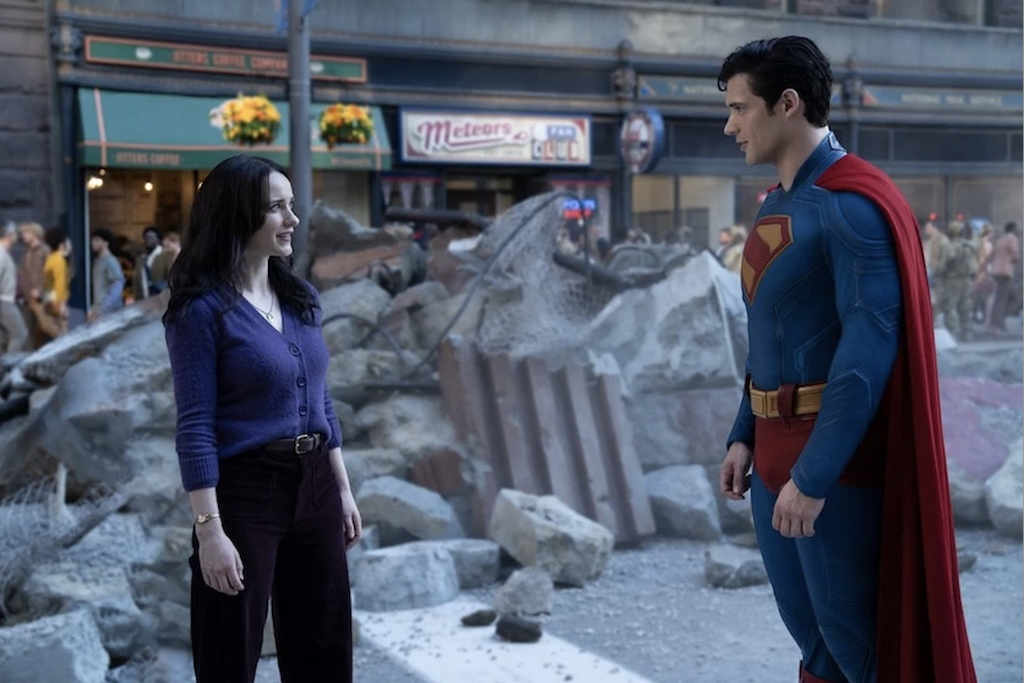Conservatives Are Losing It Over Superman’s Basic Morality
Reactionary hysterics over James Gunn’s Superman reboot bring some delight to America’s otherwise plainest superhero.

Still from Superman, 2025. (DC Studios)
I read all about the hysterical right-wing reaction to writer-director James Gunn’s Superman reboot and the claims that it features “woke” Superman propaganda because the alien protagonist is represented as an illegal immigrant, according to YouTube commentator and professional loon Ben Shapiro. He also compared this kindly Man of Steel to New York City mayoral candidate Zohran Mamdani, “whom he accused of having a ‘deep hatred’ of the United States.”
This all seemed silly at first, yet at the same time made me more apt to like the movie, as did the resulting conservative calls for a boycott that failed spectacularly. Superman cruised to a highly successful opening weekend box-office take and surprisingly good reviews as well.
However, nothing prepared me for the film’s clear evocation of Israel’s genocidal attacks on Gaza. We’re now living in such a state of weird self-censorship that Gunn himself is denying that’s what’s being represented in the film, saying as vaguely as possible, “This is a movie about kindness, and I think that’s something everyone can relate to.” He’s also made the absurd statement that, though the film is political in a way, “When I wrote this the Middle Eastern conflict wasn’t happening.”
He wrote it before 1948? Come on, James Gunn.
Whatever he might’ve begun with in the writing process, the actual images onscreen are so manifestly meant to evoke Israeli attacks on Gaza that it’s jaw-dropping. It’s actually a grim shock, while watching this light blockbuster entertainment, to suddenly be confronted with a desert setting and ragged, unarmed, brown-skinned citizens up against tanks and depersonalized heavily armored white soldiers aiming assault rifles about to massacre them.
Special attention in these scenes is devoted to the clusters of children who are going to be slaughtered if some miracle — that is, Superman — doesn’t save them. The deliberate targeting of Palestinian children by Israeli forces has been perhaps the greatest agony of witnessing the many reports of this US-backed horror show.
This kind of displacement is familiar in American filmmaking, in response to censorship pressures and fears of alienating audiences. One typical way of depicting the Vietnam War in 1970s films, a war the United States lost in 1975, was simply replacing it with another war in the narrative, whether fictional or nonfictional, relying on audience preoccupation with Vietnam to provide the real context.
George Lucas, for example, who was in line to direct Apocalypse Now (1979) before Francis Ford Coppola took on the job, has acknowledged that the original Star Wars (1977), with its freedom-fighting rebels up against the much bigger and better-equipped Empire forces, “was really about the Vietnam War.” And director Robert Altman frequently asserted about M*A*S*H (1972) — which was set during the Korean War and focused on the manic, martini-swilling pranks of surgeons trying to patch up maimed and dying teenage soldiers on the chaotic front lines — that nobody making the film or viewing it on first release was thinking of anything but the Vietnam War that haunted American consciences.
So James Gunn, take these 1970s directors as an example of sane outspokenness and what it’s like to have a spine. You know you’re deliberately evoking the genocide in Gaza. Just say so.
It seems odd to segue from that topic into a review of the otherwise larky new Superman. I enjoyed it more than I thought I would, I admit. My tolerance for Superman in his many incarnations has always hovered around zero, in spite of his admirable history as a 1938 Nazi-fighting hero dreamed up by children of Jewish immigrants, the working-class team of Jerry Siegel and Joe Shuster. He’s the square Ken doll of superheroes. But David Corenswet (Hollywood, The Politician) is unexpectedly charming and relaxed in the Clark Kent–Superman role, having no trouble uttering his squeaky-clean “What the hey, guys” dialogue.

The cast in general is appealing. As reporter Lois Lane, reconceived as a punkish tough-talker already involved with Clark Kent, Rachel Brosnahan (The Marvelous Mrs Maisel) is personable and helps create effective romantic scenes, which is no easy task. And even Skyler Gisondo (Licorice Pizza, Booksmart), in the usually thankless role of cub reporter Jimmy Olsen, gets some decent laughs when his deep source for Lex Luthor’s evil plans is a selfie-addicted airhead with a crush on him named Eve (Sara Sampaio). It’s probably not an accident that dark-haired Portuguese model-actor Sampaio’s long hair is dyed blonde and layered in a way that makes her look like she’s temporarily strayed away from the Fox News desk.
Gunn has shrewdly kicked off this reboot with an image of Superman in defeat, with blood and dirt marring that too-handsome face and too-silly superhero suit. He has to whistle for his dog, Krypto, to come and drag him home to the Fortress of Solitude in Antarctica to gather his strength and return to fight the monstrous tech bro version of Lex Luthor (Nicholas Hoult), CEO of the evildoing LuthorCorp. Superman is powered by a kind of Radical Nice ethos that he believes comes from the last recorded words of his parents, whose images (played by Bradley Cooper and Angela Sarafyan) are projected around him in the Fortress. “He finds it soothing,” explains his head robo-servant, with C-3PO-like devotion.
The garbled second half of their message will eventually be translated by Lex Luthor’s team, however, and when released on social media, results in a pile-on that calls into question Superman’s entire mandate of helpfulness with regard to the people of earth. Just think about how To Serve Man turned out to be a cookbook.
But let’s get back to the dog hero — a heavily CGI’d dog hero, but still, a dog hero — which always gets points from me. I figured Superman’s red-caped canine is unlikely to get killed, so I didn’t have to worry about him through the whole movie. He’s based on Gunn’s real dog, Ozu, a rambunctious rescue that Gunn is slyly exploiting to gain the film additional popularity, which is working like a charm. It’s reported that Krypto is so popular, he’s inspired a 500 percent rise in Google searches seeking info about dog rescue and adoption.

Comic relief and occasional practical help is provided by the Justice Gang, made up of Green Lantern (Nathan Fillion, quite funny in a terrible blonde bowl cut), Hawkgirl (Isabela Merced), and Mr Terrific (Edi Gathegi). Kenyan American actor Gathegi’s Mr Terrific is the standout here. The character is a deadpan genius, and the effortlessly suave Gathegi can get laughs even with stoic straight lines, such as when he says, in the face of epic destruction, “And that’s why you don’t create a pocket universe.”
His big action scene involves saving Lois Lane by throwing with calm assurance a series of combustible spheres at Luthor’s Raptor henchmen to the sunny pop tune “5 Years Time” by Noah and the Whale. It’s a kind of surreally delightful music video breaking out in the middle of the film, and it’s the most lovable superhero feat I’ve ever witnessed. Get this man a starring role!
But factor into the film’s little delights the sudden twinges from such scenes as the torture practices in the secret prison run by LuthorCorp, where people snatched off the street who’ve helped Superman or written unflattering blog posts about Lex Luthor are held indefinitely. The smooth glass-box prison looks nothing like “Alligator Alcatraz” or US Immigration and Customs Enforcement detention centers, and so far there’s not much specific right-wing protest against those scenes. In general, jaded commentators tend to string along with Fillion, who used the familiar line in reaction to right-wing fury, “It’s just a movie, guys.”
But infuriated conservatives like Fox News hosts Jesse Watters and Kellyanne Conway and former TV Superman Dean Cain are right about one thing: it ain’t just a movie. They’re freaking out for a reason: the possibility of the tide shifting increasingly against them in public opinion on a number of hotly contested issues, reflected and fostered by pop culture phenomena like Superman. For conveying persuasive ideological values, beliefs, and attitudes, it’s hard to beat the immediate emotional impact of popular cinema.
That fast 500 percent jump in dog rescue searches is just one tiny indication of its power.